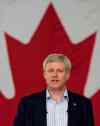Three-way fist fight for Canada
Advertisement
Read this article for free:
or
Already have an account? Log in here »
To continue reading, please subscribe:
Monthly Digital Subscription
$0 for the first 4 weeks*
- Enjoy unlimited reading on winnipegfreepress.com
- Read the E-Edition, our digital replica newspaper
- Access News Break, our award-winning app
- Play interactive puzzles
*No charge for 4 weeks then price increases to the regular rate of $19.95 plus GST every four weeks. Offer available to new and qualified returning subscribers only. Cancel any time.
Monthly Digital Subscription
$4.99/week*
- Enjoy unlimited reading on winnipegfreepress.com
- Read the E-Edition, our digital replica newspaper
- Access News Break, our award-winning app
- Play interactive puzzles
*Billed as $19.95 plus GST every four weeks. Cancel any time.
To continue reading, please subscribe:
Add Free Press access to your Brandon Sun subscription for only an additional
$1 for the first 4 weeks*
*Your next subscription payment will increase by $1.00 and you will be charged $16.99 plus GST for four weeks. After four weeks, your payment will increase to $23.99 plus GST every four weeks.
Read unlimited articles for free today:
or
Already have an account? Log in here »
Hey there, time traveller!
This article was published 07/08/2015 (3809 days ago), so information in it may no longer be current.
Anyone who thought Thursday’s leaders debate would set a tone or trend for the election must be sadly disappointed.
Partisans and decided voters, of course, all think their champion came out on top, but the general consensus seems to be it was a draw with no blood drawn.
That means undecided voters and those who may be considering strategic voting will have to raise their finger to determine which way the wind is blowing over the next two months.
That’s not to say the debate was pointless for the political parties, which must be breathing a quiet sigh of relief.
Liberal Leader Justin Trudeau held his own and showed he was on top of the issues and ready for prime time, contrary to Conservative advertising.
Conservative Leader Stephen Harper was prime ministerial, even likable (also contrary to received wisdom), and comfortable with his version of the facts. And the NDP’s Tom Mulcair performed well — tough, but not too aggressive like the pit-bull prosecutor he could sometimes resemble in question period.
As for Green party Leader Elizabeth May, she was by far the most likable of the candidates, as well as being sharp as a tack on the whole range of issues. Ms. May demonstrated the Green party is not a single-issue coalition, but a party with a national platform.
She also performed well in 2011 and in Parliament, but it has never made much of a difference for the party. It’s not because the Greens don’t have reasonable ideas; it’s because they don’t have the financial and human resources to compete.
The only surprise in the debate was the short shrift given to the state of democracy under Harper, which arguably is his Achilles heel. His Fair Elections Act, anti-terrorism bill, the abuse of omnibus bills to bury important legislation and other issues were barely discussed, but they will undoubtedly be part of the anti-Harper ammunition in the future.
With notable exceptions, political debates have rarely decided elections, but there was a risk this verbal competition could have tilted the three-way race if one of the main candidates had faltered. That could still happen in future debates or on the campaign trail.
If a winner had to be identified, it would probably be Prime Minister Stephen Harper. Not because his policy pronouncements were too good to refuse or because he has the advantage of incumbency.
No, Mr. Harper came out the winner because his main rivals did nothing to either raise or lower their popularity, although there is no polling yet to confirm this.
Nevertheless, in a three-way race, with Mr. Harper on one side and the opposition parties on the other, the advantage could easily fall to the Conservatives as a result of vote splitting. It might not be enough for a majority, but a minority government at this point is well within reach.
It’s no coincidence, then, that Mr. Mulcair and Mr. Trudeau used much of their time attacking one another, each hoping to gain some momentum over the other.
The election is said to be about the economy, the environment, security and democracy, but leadership may ultimately be the deciding factor.
Unlike the other issues — complex and loaded with conflicting and debatable data — leadership is relatively straightforward.
For some political scientists, it’s what elections are really all about. It’s not policy or vague ideas about the common good that determine outcomes, they say, but value judgments about which group of elites is preferred, and whether the incumbent elites should be kicked out in favour of another.
In that sense, the performance of the leaders in this three-way race could turn out to be the ultimate tipping point.














